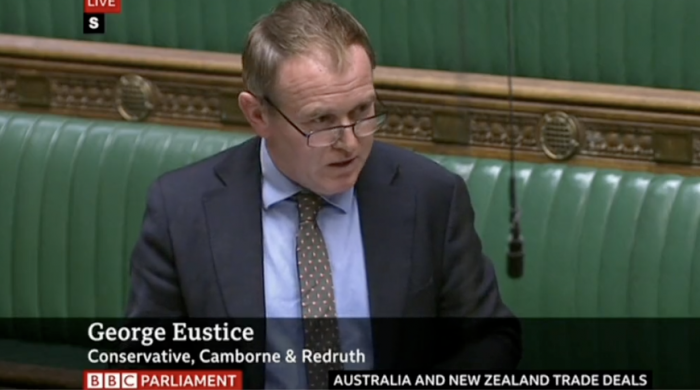Former Defra Secretary George Eustice has launched a blistering attack on former Prime Minister and International Trade Secretary Liz Truss over her handling of the Australian trade deal.
The deal included giving Australia or New Zealand full access to the UK market to the beef and sheep market, albeit phased in over 15 years. Yet Australia still bans the import of British beef and there was virtually nothing in return for UK farmers. The Government estimated the Australia-UK Free Trade Agreement, signed on 17 December 2021, would unlock £10.4bn of additional trade while ending tariffs on all UK exports to Australia.
While pork was not a part of the deal, with Australia not being significant exporters, the fear within the pig industry was that could set a dangerous precedent in future trade deals.
Mr Eustice, who was sacked by Mrs Truss when she became Prime Minister, told a Commons debate that it was a bad deal for the UK, especially its farmers, and stressed that lessons need to be learned as the UK negotiates future deals.
“Unless we recognise the failures that the Department for International Trade made during the Australia negotiations, we won’t be able to learn the lessons of future negotiations,” he said.
“There are critical negotiations underway right now notably on CPTPP (Comprehensive and Progressive Agreement for Trans-Pacific Partnership) and on Canada, and it is essential that the Department for International Trade does not repeat at the mistakes it made.
“The first step is to recognise that the Australia trade deal is not actually a very good deal for the UK.”
The Cornish MP said Ms Truss, who, as International Trade Secretary, was the lead negotiator, ‘shattered’ the UK’s negotiation. He said his former Defra colleague ‘gave away too much’ on the deal, which was warmly welcomed by Australian farmers but condemned by the British industry, which warned the deal could result in UK farmers being undercut by cheaper imports, not necessarily produced to the same standards.
He said the had UK started negotiations ‘with the strongest possible hand’, but claimed negotiators were put ‘on the back foot’ by Ms Truss demanding that the terms of the deal were agreed before a meeting of the G7 in Cornwall in June 2021. To meet this deadline civil servants at the Department for International Trade (DIT) allowed Australian negotiators to ‘shape the terms’ of the agreement, Mr Eustice argued.
Mr Eustice was part of the negotiations, but claimed Defra had tried to limit the damage and get a better deal for farmers. He said it was Defra that achieved a ‘special agricultural safeguard’, with full liberalisation to be phased in over 15 years, and also negotiated some positive outcomes on the phytosanitary rules governing the trade. “But it has to be said that overall the truth of the matter is that the UK gave away far too much for far too little in return,” the backbencher told the Commons.
Mr Eustice, who defended the deal as a Cabinet Minister, acknowledged that ge could be accused of hypocrisy, but said he was that now he is on the backbenches he ‘no longer has to put such a positive gloss on what was agreed’. In subsequent interviews he said he was bound by ‘collective responsibility’ and denied he was lying when defending the deal.




